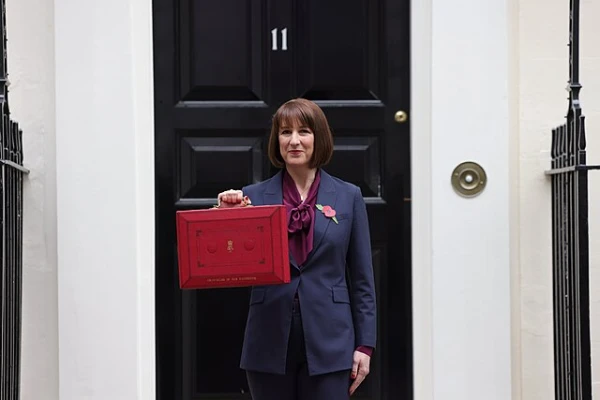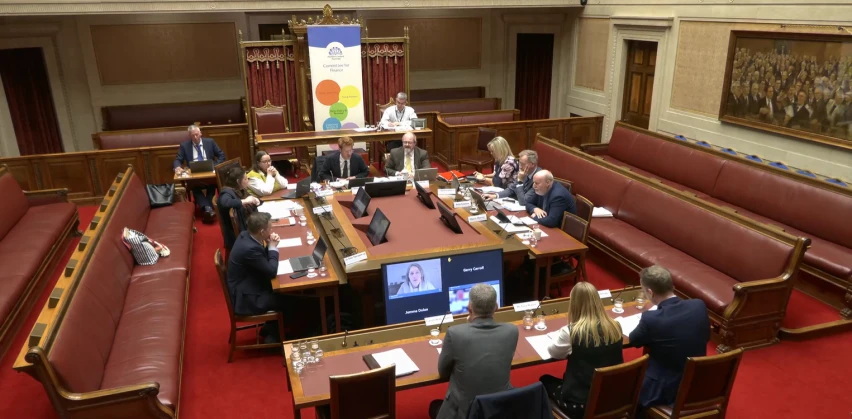
Good news on the two-child limit but Westminster Budget still leaves NI Executive with a tough financial challenge.
Chancellor Rachel Reeves has announced a small amount of extra funding for Northern Ireland, as well as tax and benefit changes that will directly impact people here – but Stormont still needs to face some harsh budgetary realities. The removal of the two-child limit in the benefits system is to be welcomed, but the extra funding that will flow to local Departments will still leave ministers with many tough decisions to make, according to analysis from Pivotal.
Chancellor Rachel Reeves’ Budget seeks to bring stability to the UK public finances following a tumultuous first 18 months for this Labour Government.
Continuing weak growth forecasts meant the Chancellor again had to plug a gap in the public finances in order to stay within her own fiscal rules.
Below, Ann Watt – the Director of Pivotal, the local think tank focused on Northern Ireland, and a veteran of several previous Westminster Budgets, sets out how this latest Budget impacts Northern Ireland, including the changes that will directly affect local people, adjustments to Stormont’s finances, and what this all means for Executive ministers.
Ann Watt, Director of Pivotal, said: “The Chancellor’s three themes for this Budget were cutting the cost of living, cutting NHS waiting lists in England, and cutting government debt. The UK economy has been sluggish for some time and the Westminster Government remains focused on kickstarting economic growth to ease pressure on households and improve public finances. Time will tell whether this is successful, particularly given businesses’ concerns about the impact of taxation and the lack of other measures to drive growth.
“Overall this is a tax-raising budget, although the Government has been able to keep its much-debated promise to avoid raising taxes on working people. Instead it has opted for a series of smaller measures, including extending the freeze in income tax thresholds, higher council tax on properties worth more than £2 million, and reforms to property taxes.
“The end to the two-child limit in the benefits system is almost certain to be replicated in Northern Ireland and will be welcomed by local families and campaigners. It is estimated to help around 14,000 households including almost 50,000 children here and should help remove some children from poverty. Other above-inflation increases to benefits and pensions will also be welcomed.
“Local businesses will be pleased to hear confirmation of the rumoured £16.6m package support post-Brexit trading. This is set to provide a single point of contact for firms looking for guidance in trading outside of NI, as well as help settling disputes.
“The increases to the National Minimum Wage will be welcomed by workers but will add to the costs facing hard-pressed businesses who are still struggling with the recent increase to Employer National Insurance Contributions, along with higher energy and other costs.
“In some areas we will need to wait to see how the Northern Ireland Executive decides to respond to changes made in the Budget. For example, the increased council tax for the highest value properties will not apply in NI, unless the Executive decides to set up a similar scheme.
“Turning to Northern Ireland’s finances, it’s important to remember that a three-year Spending Review was completed last June, which means this Budget was not going to make major changes to Stormont’s finances.
“Additions in England mean new Barnett allocations for Northern Ireland over the whole Spending Review period of £240 million resource DEL and £130 million capital DEL. The additions to resource DEL this year and next year are likely to be small.
“New spending announcements in England will not necessarily be copied here. Instead, the NI Executive can decide how to spend the extra money it has received. While all new local funding is welcome, these are relatively small amounts compared with previous uplifts. For comparison, in October 2024 the UK Budget resulted in an extra £640 million resource DEL in-year for Northern Ireland.
“Today’s new funding will only offer a small amount of relief to our public finances, which remain under huge strain. The Finance Minister said recently that there are around £400m of pressures this year, above departments’ current allocations. Local ministers will continue to have to look for savings to try and balance their own individual budgets.
“The next step locally will be the agreement of a multi-year budget for NI Departments. This is due to be published for consultation before Christmas and should cover the next three years, up to 2028-29. It will be Northern Ireland’s first multi-year budget in a decade and should allow for much more strategic planning about policy priorities. However, the harsh reality is that public finances are still under immense strain and difficult decisions will be required.
“Pivotal strongly recommends that the Executive uses the opportunity of this multi-year budget to try and move on from the repeated budgetary crises of recent years. A multi-year budget should mean stepping back and reviewing spending as a whole, asking more fundamental questions about all spending, not just additions to baselines.
“Pivotal is clear that the Executive needs to be realistic about what can be afforded within the funding available in the next three years, set realistic budgets factoring in all predicted costs – including public sector pay increases.
“A step change is required if Northern Ireland’s public services are to meet the needs of everyone who lives here. It is essential that the Executive prioritises transformation throughout the public sector, and asks fundamental questions about how and where public services are delivered. There should be a focus on early intervention and prevention in all areas of services, and ongoing reviews of how service delivery could be improved.”
ENDS
Notes to Editors
Ann Watt is available for interview. To schedule a discussion, or for any other queries, contact Ryan Miller on 07789 552 340 or ryan@millercomms.co.uk
Pivotal is an independent think tank launched in September 2019. Pivotal aims to help improve public policy in Northern Ireland
Pivotal’s published reports are available here
Pivotal’s Board of Trustees provides oversight of its work. They are David Gavaghan (Chair); Sarah Creighton; Judith Gillespie; Rosalind Skillen; Andrew McCormick; Seamus McAleavey; Alan Whysall
Pivotal’s Director Ann Watt is a former senior civil servant with 25 years’ experience in public policy development and delivery. Most recently Ann was Head of the Electoral Commission in Northern Ireland (2014-2019)
Pivotal has received funding and in-kind support from Belfast Harbour Commissioners, The Community Foundation Northern Ireland, the Department of Foreign Affairs and Trade, The Joseph Rowntree Charitable Trust, NICVA, Queen’s University Belfast, Ulster University
For further information about Pivotal see https://www.pivotalpolicy.org/ or contact Pivotal’s Director Ann Watt on 07932 043835
Follow Pivotal on X/Twitter @pivotalpolicy, LinkedIn @Pivotalpolicy and Blue Sky @pivotalpolicy.bsky.social












